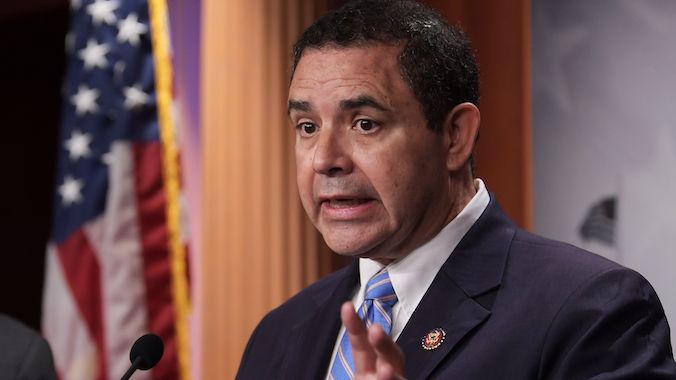What Does the U.N. Climate Conference Have To Do With this Texas Congressman’s Corruption Indictment?
Photo by Lenin Nolly/NurPhoto/Shutterstock
Texas Democrat Henry Cuellar was charged along with his wife Imelda on Friday in what federal authorities said was a years-long scheme to accept bribes and influence Congressional activity on behalf of foreign entities. I swear this is a climate change story.
The indictment alleges that Cuellar and his wife accepted almost $600,000 from a Mexican bank and a state-owned Azerbaijani oil company. The Congressman, whose home was raided in 2022 and then won a narrow primary victory over progressive Jessica Cisneros thanks in part to support from the decaying old guard of the Democratic Party, has denied the charges.
Both the bank and the oil company are unnamed in the charging documents, but the latter is a bit easier to suss out. Azerbaijan’s state-owned oil company is called, creatively, the State Oil Company of the Azerbaijan Republic, or SOCAR. It has been involved in Congressional chicanery before: in 2013 it funneled $750,000 through various secret channels to pay for 10 members of Congress to attend a lavish trip to the capital, Baku.
In Cuellar’s case, it seems that SOCAR sort of stood in for the Azerbaijani government in general. According to the feds, he agreed to, among other things, “influence a series of legislative measures relating to Azerbaijan’s conflict with neighboring Armenia; to insert language favored by Azerbaijan into legislation and committee reports governing certain security and economic aid programs; to deliver a pro-Azerbaijan speech on the floor of the House of Representatives.”
On its surface, this isn’t a list of traditional oil company priorities — but that’s the thing about state-owned fossil fuel entities, there isn’t really a meaningful boundary between what’s good for SOCAR and what’s good for Azerbaijan. Though it is not among the largest reserves in the world (in the low 20s on the list for oil, and a bit higher for gas), the country is remarkably dependent on its oil and gas resources, accounting for 40 percent of its GDP and 90 percent of its export income.
So a country more or less synonymous with its oil industry has allegedly been bribing a Member of Congress to push for American help with its various priorities. Also, that country is about to host the U.N.’s climate change conference.
COP29, slated for Baku in November, follows on the heels of the historic-but-disappointing result of COP28 in Dubai. That meeting yielded a first-ever global agreement to “transition away” from fossil fuel use, though it contained various loopholes that disappointed activists. Still, it was progress over the previous 27 COPs, and observers and good-faith participants will certainly hope that the sequel in Baku will increase ambition, address the lagging indicators of climate progress, and more.
The efforts in Dubai were also marred by the host country’s choice of COP president: Sultan Al-Jaber, who also happened to head up ADNOC, the Abu Dhabi state-owned oil behemoth. The obvious conflict didn’t seem to bother Al-Jaber or the UAE much, and Azerbaijan clearly wasn’t thrown off by the controversy: In January the country appointed Mukhtar Babayev as COP29 president, the government’s ecology and natural resource minister. Sounds fine, until you move down his resume a bit: prior to his ministerial role, Babayev spent 24 years at SOCAR.
This is less about some grand conspiracy to stop climate action and more about the sheer reach of the global oil industry’s tentacles, constantly sliming their way into and out of various halls of power. Whether its a few hundred grand to an allegedly greedy and easily bought Congressman or an industry veteran supposedly shepherding the world further away from the dirty stuff, those tentacles are going to be there, holding the world back, until we collectively agree to hack them all off at once.